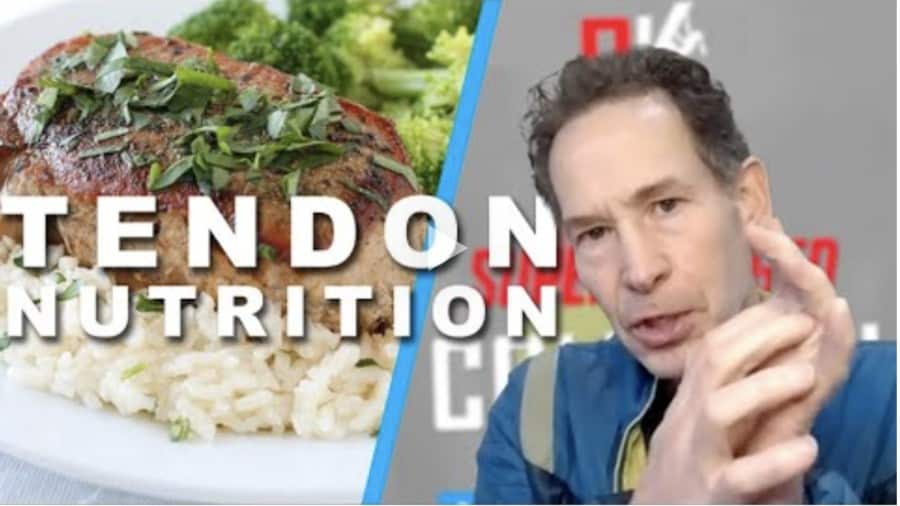What you eat actually changes how your tendons recover and can help them get stronger.
This is actually part three of a three part series so if you haven’t read part one where we talk about the science of tendons and part two about exercises for recovering from sore tendons and what you can do to get them stronger, be sure to check that out as well.
Today, we’re going to talk about what you eat, specifically super collagen, which we will get into in this third part of the interview with Eric Horst.
Research about tendon nutrition
There’s some excellent research by Dr. Keith, out of UC Davis and a couple of other research centers as well that work with athletes and rehabs from injuries like knee surgery and such. They’ve experimented in the lab and with athlete case studies, with certain nutritional interventions that can support the recovery, like with muscles we know very well.
It’s widely accepted that consuming protein that’s high in the branch chain amino acids is excellent for muscle recovery. When you do a hard weightlifting workout or climbing workout you follow that with drinking a whey protein shake afterwards or before bed that night.
That’s excellent for muscle recovery because branched chain amino acids are what really propelled the recovery of the contractile fibers in the muscles while connective tissues.
Tendons and ligaments are made of protein as well, but they’re made of two thirds of collagen, which is two amino acids, glycine and proline. And whey protein is actually very low in those two amino acids.
What food is good for tendons and ligaments?
For the amino acids that comprise protein in our foods, the individual amino acids are in different proportions in different foods. Whey protein, for example, is high in those branched chain amino acids, which is great for muscle recovery.
The two amino acids that comprise much of our connective tissues is in very low amounts in a lot of foods. Plant based foods and even milk based products, for example, are low in Glycine and Proline.
Meat is rich in those proteins but a lot of climbers don’t eat a lot of meat. The richest “normal” food in terms of glycine is pork. So if a climber ate three servings of pork every day, that would be a really good thing for their connective tissues.
But who’s going to do that? It’s not realistic.
Something like a collagen supplement like the supercharged collagen by PhysiVantage (a company founded by Eric Horst) is hydrolyzed collagen. It is the richest, in terms of foods, that have those two amino acids that comprise ligaments and tendons. This is the richest food on the planet, literally even better than pork.
Plus, it’s easy to consume – you just put a scoop of it into water or juice or any other beverage and consume it. You basically introduce this spike of glycine and prolene, the two key amino acids, into your bloodstream where they can be utilized by connective tissue.
The best time to consume collagen
The connective tissue is fed by the loading process. If you consume this product one hour before you load your tendons, that is actually the evidence-based way to best support collagen synthesis in your tendons and ligaments.
If you’re recovering from ACL surgery in your knee, you would consume this product. And then an hour later you would do jump rope or you would do your knee rehab. In the case of a finger injury, a sore finger, you’d do this before doing rehab exercises such as squeezing a tennis ball.
Thousands of healthy climbers that want to be proactive, consume it an hour before they go to the climbing gym or they put it into a shaker bottle and drink it during their warm up at the climbing gym or at the crag so that they get that spike of those amino acids into their bloodstream.
As they begin to climb, they meet that goal of coupling the nutrition with loading together, which has been shown to give optimal results.
If People want to learn more go to PhysiVantage.com
Some people won’t benefit from collagen
The caveat is that if you’re not training right and you’re not making an attempt to eat right, then nutritional products aren’t going to save you. It’s not a magic bullet that makes up for bad training and bad diet practices. It’s a waste of money in those situations, to be honest.
But to someone who’s really trying to do their best to train properly and trying to have a an excellent diet can make things better with some supplemental products like the Supercharges College, and before you train and whey, protein, before bed.
Now what?
A lot of times we talk about trial and error and injury, but actually talking about this now before you get injured is super crucial.
If you have a friend who’s been climbing for a couple of months, maybe they’re getting into harder routes, send them this series because you want to prevent injury before it happens.
More About Safety and First Aid:
- Taping Fingers For Climbing: Why And How
- Proper Nutrition For Tendons For Climbers
- Exercises To Prevent Tendon Injuries For Climbers
- Climbers’ Tendon Injuries And What Causes Them
- 5 Common Injuries In Climbing And How To Prevent Them
- Climbers Guide: First Aid Kit
- How Do You Deal With Climbing Flappers? Prevention And Care
- Should You Wear A Helmet For Bouldering?


